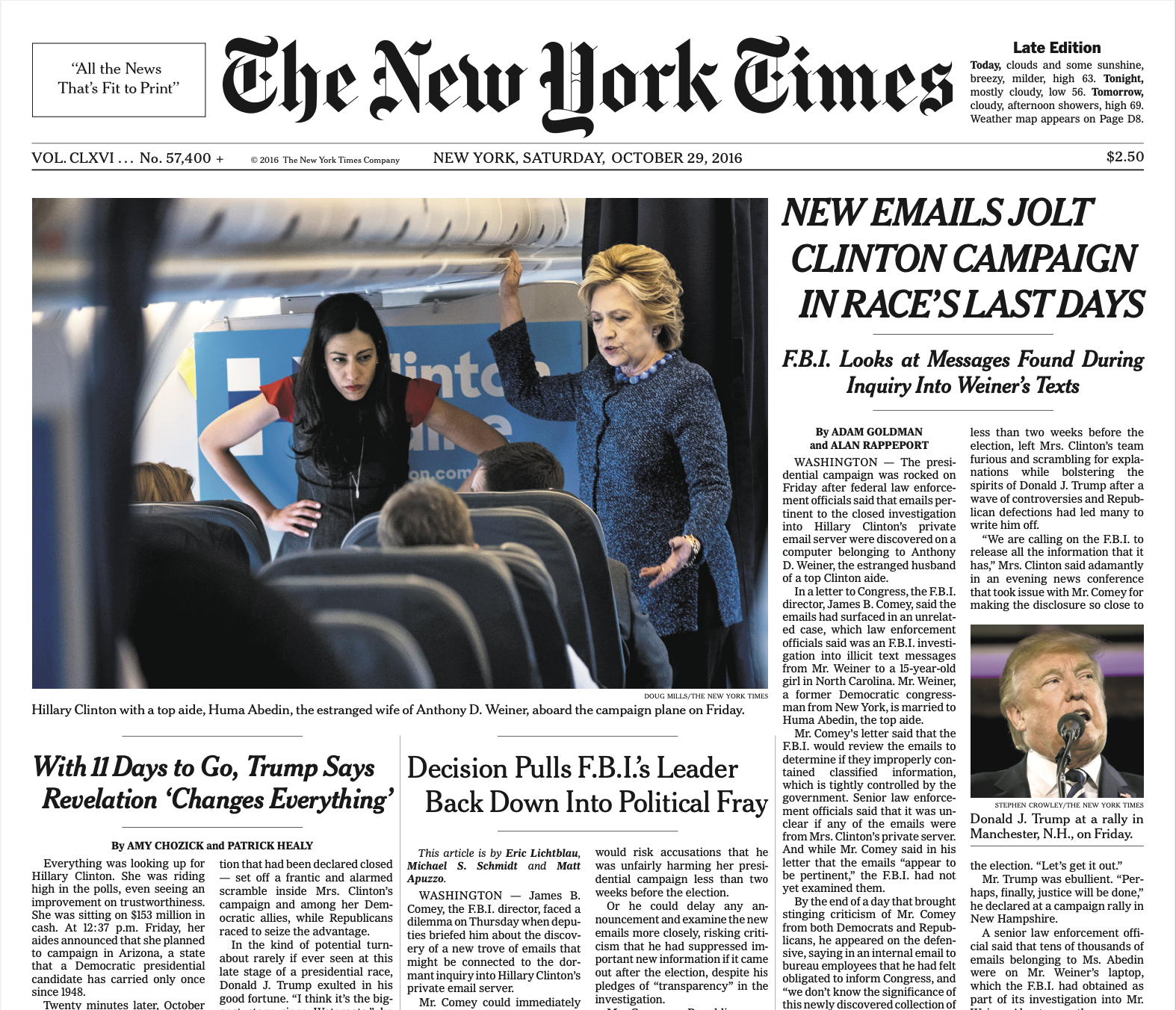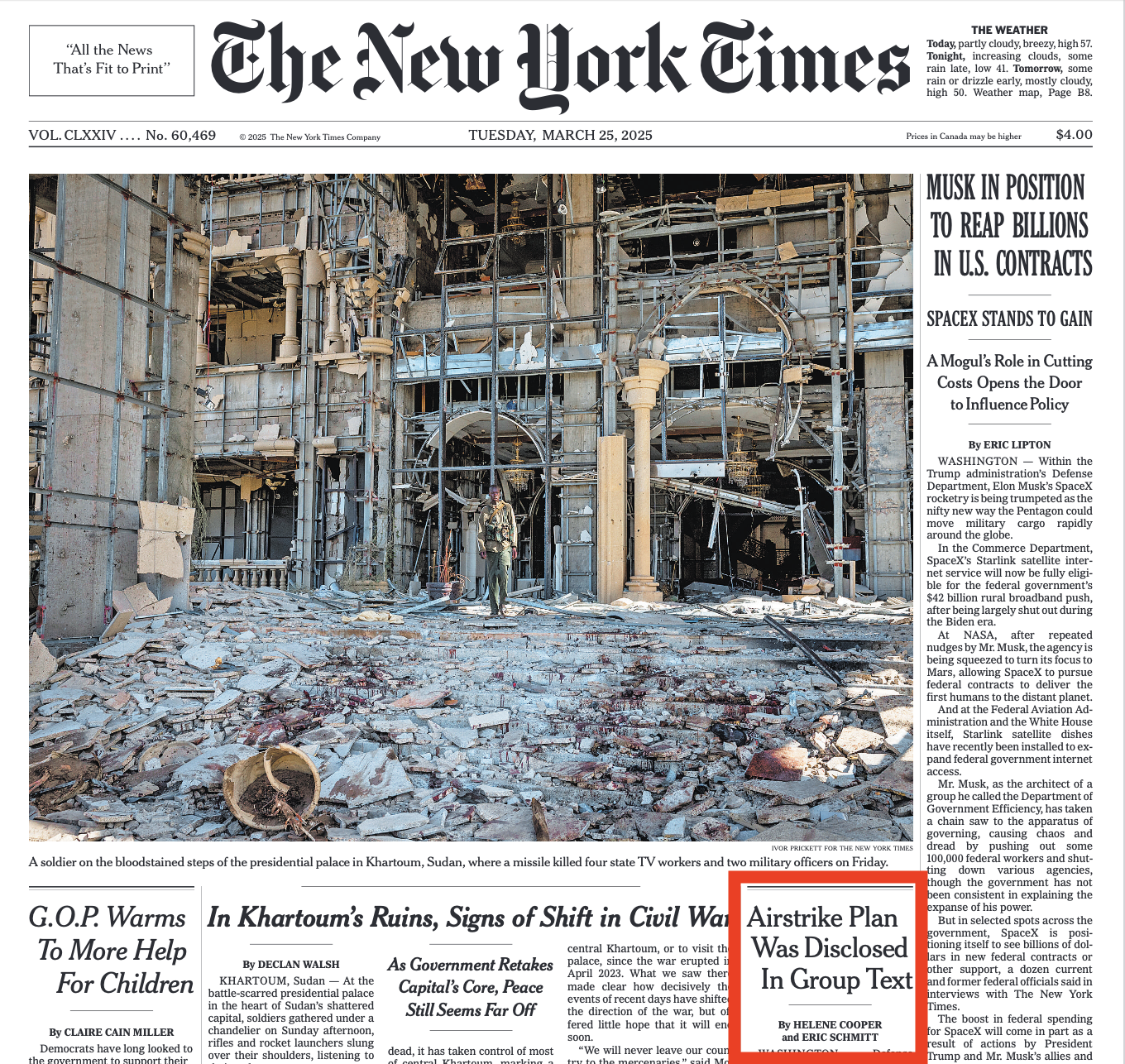New phone, Houthis?

Yesterday, The Atlantic published an article. Whether you want to call the article "explosive," "dumbfounding," or "stunning," it is remarkable in how unlike it is from anything that has, uh, ever happened.

For anyone who winds up staring at the paywall of this article, here is the basic, insane gist:
- Jeffrey Goldberg, literal Editor in Chief of The Atlantic, was added to a group chat by National Security Advisor Michael Waltz
- The group chat, called "Houthi PC small group," appeared to comprise of some of the Trump administration's absolute most senior members. This includes JD Vance, Pete Hegseth, Marco Rubio, and shande fur de goyim cum "I-know-you-are-but-what-am-I" pedant Stephen Miller.
- The content of the group chat, which was carried out on an encrypted messaging app called Signal, included policy discussion and specific, minute-by-minute planning of airstrikes on Houthi rebels in Yemen.
- Thinking he was potentially on CSPAN's reboot of Punk'd, Goldberg lurked, observing the chat until plans that had been shared in the chat became real.
- After the strikes that appeared to be discussed in the chat occurred, Goldberg left the chat.
Just to get it out of the way, it's important that I say that these actions represent a high level of incompetence, disrespect for the rule of law, and dangerous political malfeasance. The Trump camp has famously mishandled classified material and channels before, but a detail about this instance, that Mike Waltz had set certain messages in the chat to disappear after varied periods of time, adds another infraction to the ledger. See, we have laws that require government conversations and data to be preserved. Current communication tools used by the government have to comply with this regulation to be used. Which is why Signal is not authorized for classified conversations.
Either Waltz and the Trump people don't know this, which is bad enough on its face, or, more likely, they know this and they don't care. Lot easier to do crimes when your messages auto delete and can't be accessed in the case of, say, a Watergate level corruption investigation.
There are two angles from which I want to talk about this story. On one hand we have a tech story, one about the rapid development of consumer technology has outpaced the so-called savvy of political operators. On the other hand we have a media story, one about the tight integration between the power of the government and the power of the media.
The Tech story
Who amongst us hasn't mistakenly added the wrong person to a group chat? Of the many apps you use, do you really understand how they work?
I ask these questions with little judgement. Nobody out here is reading the terms and conditions, no one is going through each line item on the cookie selection menu.
But the National Security Advisor, the Secretary of Defense, and the Secretary of State are not exactly "no one." The very titles, the job descriptions, require a modern understanding and a thoughtful vigilance in all things, especially technology. These roles make decisions that effect the lives and deaths of human beings. The protocols, regulations, and precedents of these jobs require clear headed, emotionally stable people.
Not, as is evident here, the jaw-clenched sandbox-truck-throwing petulance of a man whose own administration didn't tell him they had already confirmed what he lies about here:
Reporter: Can you share how your information about war plans was shared with a journalist? Hegseth: So you are talking about a deceitful and highly discredited so-called journalist who has made a profession of peddling hoaxes
— Acyn (@acyn.bsky.social) 2025-03-24T23:13:45.529Z
A government that fails to have curiosity or savviness with technology is opening itself up to being undermined both at home and abroad. If you're a tech lobbyist, and you know that the god damn National Security Advisor doesn't have the sense not just to not have war planning discussions over unclassified channels, but to also mistakenly add possibly the worst possible human on the planet to add to your war planning group chat, then you know that the rubes you are lobbying are pliable, unserious operators. More bleakly, imagine you are doing foreign espionage, seeking to gain highly sensitive information. If you know that all you have to do is make a Signal account and pose as someone else you might just...get added to the war plans chat.
This story tells us that the rotted ghouls who make the calls for the bombs don't even have the savvy that every person invited to a Partiful has to scrutinize the RSVP list of your friend's "Going Away Drinks!!!" invite.
A slightly more tech literate ruling class would understand the limitations and pitfalls of communicating sensitive information over any app. They would also have the diligence and prudence to ensure that each and every person in that chat was who they intended for them to be. And this is before we even get to the content of the chat, which is so wildly inappropriate to have had over this channel and freakishly war hungry that, in its brazenness, almost feels deliberately performative even for a limited audience.
The Media Story
Between October 28, 2016 and Election Day, November 8, 2016, The New York Times published 44 articles related to Hillary's emails. That's four articles a day. In the first 6 days, the Times published 10 front page stories about it. Here is the "above the fold" portion of the front page of October 29th's Times:

Despite having won the popular vote, Hillary ended up losing this election. While the likely main cause of this was her mistaken approach to the Midwest (which is to say, her absent approach to the Midwest), there is incontrovertible evidence that Comey's investigation and the ensuing media firestorm confirmed preexisting biases about Hillary's competence, crookedness, and coldness, and drew voters away from her.
I'm not here to relitigate Hillary's emails (although if you want to, take a listen to this If Books Could Kill episode). What does strike me, though, is a repeated pattern across our mainstream media of downplaying Trump's infractions by:
- Setting them up as equal to Democrats'.
- Lumping them in with the other bad things he and his people have done.
- Ignoring them altogether.
Hillary, WHILE HER "SIDE" WAS IN THE FEDERAL GOVERNMENT, was investigated for failing to correctly handle classified material on her private email server. While, yes, some of this material was already deemed classified at the time, much of it was categorized as such after it had been through her servers. None of what was in there had anything really to do with war, in fact much of the early commentary on it was about perfectly named politician Anthony Weiner. The investigation led to Hillary being interrogated by the FBI for 11 consecutive hours, being forced to sit for bad faith congressional hearings, and hearing crowds cheer for her incarceration and lynching.
I should say that I don't think the email scandal was entirely nothing! I think people deserved to know about it, but I also believe that it is the responsibility of journalists to provide context for readers, especially in such high stakes moments.
There is a seemingly impenetrable bias toward pseudo-balance in which accurately characterizing the profound imbalance in crookedness and incompetence is stifled by the need to appear fair. What such deference causes, though, is the feeling that what the Democrats do and what the Republicans do are on some level playing field. At the governmental level, this means over scrutinizing the Democrats, taking them to task for the most pedestrian of perceived infractions and under scrutinizing the Republicans, even when their actions are more dangerous or egregious. For examples of this, might I point you toward Politifact, where fact checkers fling Pinocchio ratings about for minor misstatements from Democrats but paint less broadly for the Republicans.
On the ground, this pseudo-balance manifests in the treatment of protestors and dissidents by the media. While pearls were certainly clutched by the analyst set after the Charlottesville Unite the Right rally or the January 6th insurrection, the analysis of these events did not receive even close to the kind of press coverage college protests against Israel's genocide in Gaza got or defacements of Tesla superchargers gets today. Whereas the actions of left leaning operators are taken to represent the entire political left, forcing true blue federal Democrats to answer for relatively powerless constituents of theirs, right wing militant violence and racial terrorism is never treated with the same hounding media scrutiny. Donald Trump has never been forced to answer for his "nice people on both sides" statement, or the "beautiful day" characterization of J6.
Which gets at the second pattern of the media to repeatedly downplay the severity of new infractions by merely adding them to an ongoing tally.
Look, I get it. If you are The New York Times you cannot give every single Trump story A1 billing. This is extremely challenging! I know! What might be a minor story may end up becoming more important, and what at first may seem like a big deal may become less so as time moves on. But the inability of the media to accurately demonstrate the "scale of bad" of each new story just leads them to putting all of it in a firehose of news.
This can be adequately expressed in the "chyronification" of important news. The chyron, the strip of text that lines the bottom of most cable news programming, is an important tool used by producers of television to set the context of what is going on. The chyron often has to do a lot of heavy lifting, as CNN or Fox News or CNBC or whomever plays silently in a dentist's waiting room. In using the timeless formula of boxes of suited humans above the chyron, irregular followers of politics may use their desultory glances at the news to jump to extensive conclusions about what they are watching. One thing that may occur is this flattening of severity, where one day's chyron kinda looks like the next day's, and the Anderson Coopers talking on the screen look the same the next day. Thus, when something really serious happens, like a pandemic, or quid pro quo corruption, or an assassination attempt, the news all gets muddied.
"There's so much going on," audiences might resolve, "that I can't keep track of it all." It shouldn't be the individual's job to know everything about everything in order to understand the scale of importance of a new piece of information. A healthy, thriving media apparatus should help to do this before the news even hits your brain. A couple of Trump's most inner circle elites fuck up and send war emojis in an unsecured group chat? Just adding it to the list of crazy shit both lowers the perceived severity of this individual event and the other events it gets lumped in with.
The last pattern of these media practices is to just simply ignore important or unspoken narratives. Often, this looks like extreme underreporting but sometimes it is just as simple as never once talking about something. Last week, there was some online furor about Commerce Secretary and billionaire Howard Lutnick saying that the people most concerned about missed Social Security checks are probably "fraudsters." On its face, this is a ludicrous statement, and a journalistic apparatus worth a damn would seek out whether this claim is true, first by analyzing available data and then by seeking out individuals who receive benefit checks and asking whether they would call up the agency if they missed a check.
That linked article above includes one short paragraph about the pushback:
The rhetoric has prompted pushback from experts and advocates who have accused Trump allies of spreading false claims about the amount of fraud actually found in the program.
The article is 769 words long. 335 of them are from direct quotes from Lutnick. The New York Times didn't publish anything about this.
And I get it, this is small potatoes. This is just one dude in a relatively less powerful cabinet position just yapping on a podcast. But if you're gunna devote a ton of your real estate to voter panels about the issues, vaunting misinformation to the front of your respected newspaper, you might as well also include this sort of thing.
Finally, here is the front page of today's New York Times. Note the section I highlighted which comprises the extent of the above the fold recognition the Signal group chat story got.

I don't have much hope that this story will get the attention it deserves. Without that attention, the Democrats won't face pressure to call for resignations. Without that attention, the Republicans are given tacit approval to continue fucking up. "We promise we won't care enough to make you act any differently," we might be saying to them.
While this story demonstrates and supports the case for incompetence across the board, its implications are far reaching, and our continued failure to hold the powerful accountable has already landed us in this fraught moment. If planes can fall out of the sky, if "let them get Bird Flu" is the official position of the feds, if war plans can get sent around a group chat, and there isn't meaningful pushback, it just allows them to keep doing what they are doing.
What happens next feels pretty obvious. This story gets normalized, makes the opposition complacent, and forgotten as a minor weekend mishap. Some Democrats call for resignations, others don't, citing their self-satisfied commitment to working with the rot across the aisle. And the rest of us just wait as the floodwaters circle the drain, upvoting Luigi's letters from prison or sipping from paper straws until the world we could've had is too irretrievable to pull from our hope.






